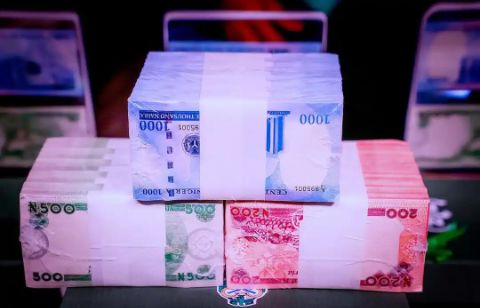Nigerians’ uglier sides are coming out as a result of the continuing currency crisis. Some bank clients are taking mob action, attacking banks and bankers, and torching ATMs and other facilities because they are frustrated, irate, and hungry, Entrepreneurng report.
One such outburst in Sagamu, Ogun State, led to the closure of other banks in the town as well as the destruction of the branches of two deposit money banks. Police should make sure to apprehend and prosecute those responsible for that atrocity and any similar assaults around the country, as well as put in place the necessary safeguards to protect banks from additional attacks.
Godwin Emefiele, the governor of the Central Bank of Nigeria, and President Major General Muhammadu Buhari (ret.) supported a plan to replace the N1,000, N500, and N200 banknotes with redesigned ones under a tight deadline that caused agony throughout the nation.
Yet, it is now abundantly evident that the CBN lacks the institutional capability to produce a sufficient number of fresh banknotes and distribute them to the general public within the allotted time frame.
The ultimate effect has been increased hunger as well as the failure of enterprises and livelihoods since Nigerians are unable to obtain the new banknotes while the old ones are no longer accepted as legal tender. Crowds at banks that either doesn’t have the new notes at all, have them in very little quantities, or have given them to preferred customers are frustrated as a result of this.
Many bank branches, particularly in rural regions, have temporarily closed; others are only open for a few hours or on alternating days; and the sudden increase in traffic has overwhelmed ATMs and internet banking channels.
Read Also: Naira Note Scarcity: What People Are Saying & How to Survive The Current Situation
Riots have started. As usual, hoodlums, thugs, and throngs of lazy, drug-using urchins frequently take over these protests. Usman Baba, the Inspector-General of Police, should issue strict instructions to all formation commanders at all levels to secure the banks. The state commissioners of police should take immediate additional measures to stop attacks on banks, their personnel, and facilities.
Emefiele is undoubtedly causing a great deal of suffering to Nigerians. This is particularly true in a nation where 133 million people or more than 60 percent of the population have already been classified as “multidimensionally poor,” where youth unemployment is rife and inflation and hunger are at all-time highs. So, the widespread fury sparked by the naira provocation is understandable and even predictable.
Young people in Sagamu set fire to Union and Keystone bank branches as a form of protest against the limited supply of the new naira notes. Roads were blocked off, and bonfires were lit. Similar protestors had blocked off a section of the Lagos-Ibadan Expressway from Magboro to Mowe the Friday before and many others.
Banks and financial institutions have suffered vandalism and arson. While security personnel rushed to put an end to the riots and stop them from spreading to other parts of the country and some lives were lost.
However, the CBN planted the seed in October 2022 when it stated that the previous N200, N500, and N1,000 banknotes will no longer be in circulation. Emefiele stated that the old notes would no longer be considered legal currency by January 31 after the new notes went into circulation on December 15.
Although, It listed some good reasons, such as addressing inflation, controlling the amount of money in circulation outside of banks, and combating money laundering.
Emefiele boasted that by the end of January, there was N1.9 trillion in bank vaults, up from the N3.26 trillion that was in circulation before the policy, of which only N500 billion, or 15.29 percent, was in the legal banking system.
According to him, the removal of the old notes will ultimately lower inflation since supply and demand for cash would be simpler to control. The new currency is also intended to undermine the burgeoning kidnapping-for-ransom business.
Conclusion
Nevertheless, attacking bank employees and damaging financial institutions is barbarous and is an inappropriate act of aggressiveness. Attacking private or public property is not a legal form of protest, even if Nigerians have the right indeed and a duty to oppose harmful government actions.
This is an opportunity for the police to severely crack down on mob justice. Punishment for arsonists and vandals is necessary. End the suffering of Nigerians, prolong the deadline, and rethink your strategy.











